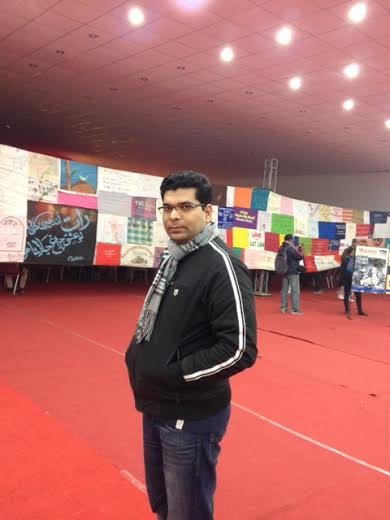Meet Tanzil Rahman from Sufi Comics: Rumi
With his range of impressive studies and creative talents, to being an avid member of the Rumi fan club, Tanzil Rahman is an interesting member of the hardworking team behind Sufi Comics: Rumi. From being involved in livelihood support for communities living in urban slums, acting in various plays, to writing powerful poetry on the idea of social justice, Tanzil's contribution to the new project is inspired and invaluable.His work with Sufi Comics: Rumi has been around the selection and research behind the poems, as well as sourcing the original Farsi text for the short-listed poems.Tanzil reveals how the collaboration came about, dispells the view that you can't be a spiritual activist, as well as us why we should stay tuned for Sufi Comics: Rumi!
Tell us a bit about yourself. What's your educational/professional background?
"I come from a village in Darbhanga district of North Bihar. My family later settled in Aligarh in UP. I have studied Electronics Engineering at Aligarh Muslim University and General Management at Indian Institute of Management Bangalore.Professionally my expertise is in the area of Human Resource strategy primarily advising organizations on how to leverage technology for HR transformation. I am currently employed with software major SAP."
How did you meet Arif and Ali?
"I met Arif and Ali bhai for the first time at the Quran Study circle of Dr. Taha Mateen in Bangalore. We connected in very first interactions. I liked their progressive and pragmatic approach to issues and things while adhering to the basics."
How did the collaboration with Sufi Comics : Rumi come about?
"I had known and read Sufi Comics' earlier editions. Arif bhai has discussed these a few times to get my feedback and reaction as a reader. It was while discussing “The Wise Fool of Baghdad” that he mentioned about his plans to do next edition of Sufi Comics on Maualana Rum's poems. He also mentioned that he has short listed some poems from a translation that I had gifted him earlier. Having been an avid member of Rumi fan club , I jumped on the opportunity and requested that I would like to collaborate which he accepted warmly."
Tell us about your role in Sufi Comics: Rumi. What do you enjoy about this role, and what do you find most challenging, and why? How do you overcome these challenges?
"Primarily my role has been around selection of poems and stories based on the translation and locating the source in the Farsi originals of Maulana's various works such as Mathnavi, Divan e Shams and Fi hi ma Fi hi. I also cross check if the English translations are in alignment with the original text. Then I work with the team to ensure that the storyboard and artwork are in alignment with the text. In addition , I am also working on finding the relevant verses from Quran which summarize the key message from the story.
“Having been an avid member of Rumi fan club , I jumped on the opportunity and requested that I would like to collaborate.”
One major challenge has been the difficulty in locating the original text for some of the popular Rumi poems in English. It has also been challenging to get originals for books such as Aflaki's Manqabat-ul-Arifeen which many of the English translations have cited as the source.As we are no longer co-located and I am based out of New Delhi now, we end up doing all our discussions online with tools such as Hangout with occasional face to face meetings in Bangalore. Additionally , in my day job I keep travelling very often and that also puts pressure sometimes on our scheduled discussions. Nevertheless , being flexible with scheduled and ability to use technology helps us overcome these operational challenges."
When were you first introduced to Rumi?
"I first came to know of Rumi while reading a poem of Allama Iqbal. The poem is titled as " Mureed-e-Hindi aur Peer-e-Rumi (Indian Disciple and the Teacher from Rum)". In this poem Iqbal imagines himself to be Rumi's disciple and asks him a number of profound questions and uses Rumi's original poetry to answer these questions.The poem has a major impact on me because many of those questions were what I have been struggling to understand myself. I started reading Maualana 's biography by Annemarie Schimmel and kept getting drawn to his work and life. I read wherever English translations of his poetry I could lay my hands on. After this I started serious reading of Mathnavi in the original Farsi with the help of an Urdu translation."
Who/what are your biggest inspirations and why?
"This is a difficult question because I have such long list which keeps growing. My early inspirations were the Prophet ( pbuh) and his close companions and their struggle for establishing the truth. I also grew highly inspired by the leaders of our freedom struggle Mahatma Gandhi, Maulana Azad , Pandit Nehru , Subhash Chandra Bose , B R Ambedkar and Bhagat Singh.Later in college , I got to understand the reformist work of Sir Syed and Allama Iqbal and they became role models for life. Overtime I have been inspired by a number of writers , poets , artists and activists such as Maulana Rum, Mirza Ghalib, Faiz Ahmed Faiz , Edward Said, Dilip Kumar , Habib Tanvir , Medha Patkar, Bob Dylan , Arundhati Roy, Shyam Benegal and many more.There have been others at more personal level , my parents , my maternal uncle , many of the people whom I have worked and interacted with and I and still keep getting inspired. I think the primary reason for these inspirations have been their equal onus on both thoughts and action. Also, their honesty , humility and humanity while being at the forefront of their respective areas of influence."
I hear that you are a very talented poet, with your poetry exploring various social and political issues. Tell us about these themes/ issues you explore, what inspires you, and why you feel it is important to stand in the frontline of the important issues?
While I try my hands on all kind of topics , what I end up writing most of the times is about the idea of justice and the constant struggle needed for its achievement. I also write on the double speak and intellectual arrogance that characterize our culture these days. Sometimes, I write about deeper things such as love, loss and longing. I am not very sure if my poetry is a conscious effort to stand in the frontline of important issues. Whenever there is an urge to express, it finds its way.
Tell us more about your social activism? What are you passionate about?
"The idea of justice and respect for human rights and dignity is what I am most passionate about. However I must say that I have been just scraping the surface and staying connected and have not really been involved in any fundamental change.In the past I have worked with government schools to improve the quality of education and scholarship programs to support economically weaker students. I have also been involved in livelihood support for communities living in urban slums. I have worked with human rights groups on highlighting various issues such as communal and caste based violence, development led displacements, excesses of extraordinary laws etc."
Some people may view social activism and spirituality as complete opposites. What does social activism and spirituality mean to you, and can they go hand in hand?
"Interestingly most of the honest and genuine activists that I have met in the field, I have found them to be deeply spiritual. While they may not be religious in outwardly sense but most of them seem to have a deep consciousness of their inner selves and strong connect with the Almighty. I personally feel that the real activism draws its strength from this consciousness and connect."
I also see that you've acted in various plays/drama and theatre. Tell us more about what you did?
"I have been interested in theatre since my school days and have worked in various plays. Theatre has a great medium where you can live somebody else’s life in real time on stage and it requires a great deal of empathy. It gives you great insight into people, their behaviors and motivations and makes you realize your humanity.Last time I acted was in a play called ‘Rizwan’ which was written and directed by Abhishek Majumdar , a highly talented playwright and director based in Bangalore. The play explored the life and psyche of a young Kashmiri boy caught in the conflict zone.I also recently translated William Shakespeare’ play ‘The Winter’s Tale’ in Hindustani for a production in Delhi. While theatre remains an avid interest, I am not able to find much time to devote to this."
“Interestingly most of the honest and genuine activists that I have met in the field, I have found them to be deeply spiritual.”
What are your plans for the future?
"We are all eagerly looking forward to Sufi Comics: Rumi’s release very soon. I also intend to publish collection of my poetry sometime in near term."
What's most exciting about Sufi Comics: Rumi? Why should readers stay tuned?
"I think Sufi Comics: Rumi is a unique experiment which aims to interpret some of Maulana’s great poems in the visual form in contemporary context while keeping it connected with the original text and its linkage back to the themes in Quran. I am confident that it will be a delight for both for those who know and understand Rumi and for the beginners who are going to be initiated into Rumi’s world."
Last but not least, what do you think of Sufi Comics?
"Sufi Comics is a laudable initiative by Brothers Arif and Ali Vakil who chose to use a progressive and pragmatic language to interpret our glorious heritage rather than getting caught in fruitless arguments about right and wrong. I have enjoyed the conversions and the collaboration and feel excited to be part of this team."Our Books are available to buy Online: 40 Sufi Comics & Wise Fool of BaghdadWrite for Sufi Comics. Read our brief here!Subscribe to our Newsletter for updates on Sufi Comics: Rumi, and download your Free “40 Sufi Comics” E-book today!

